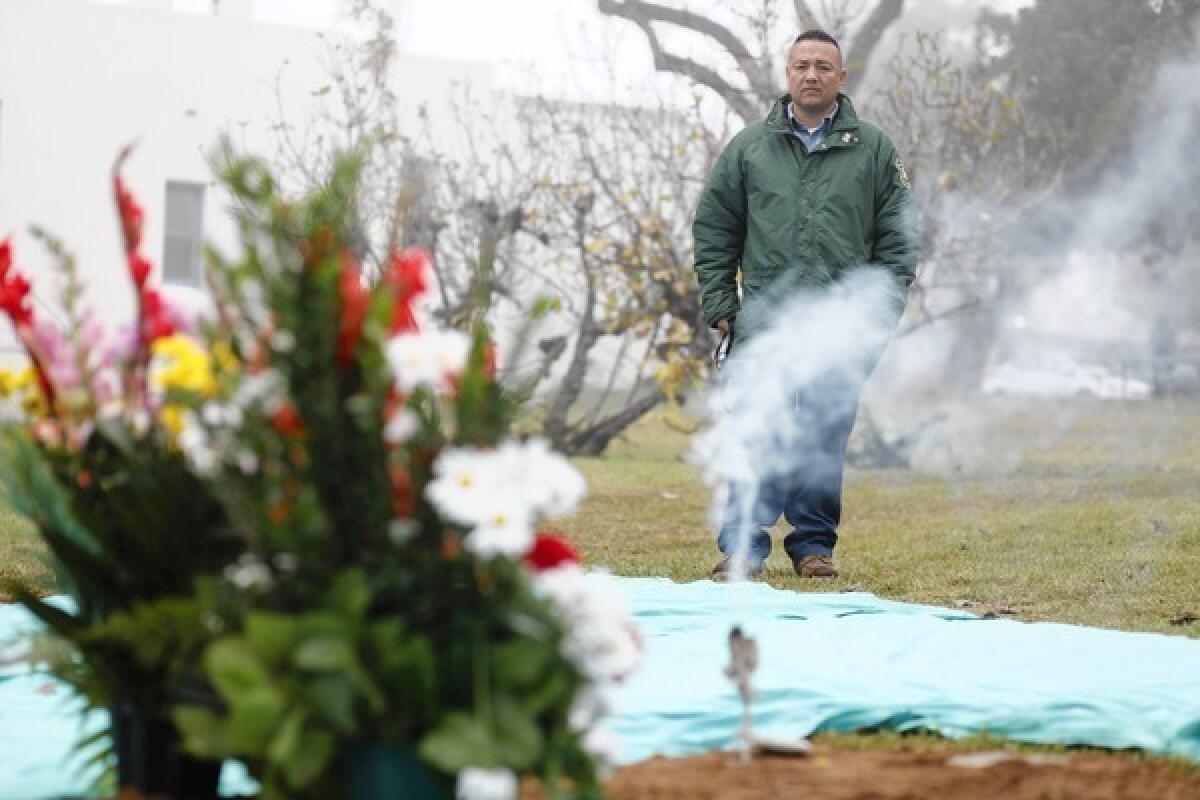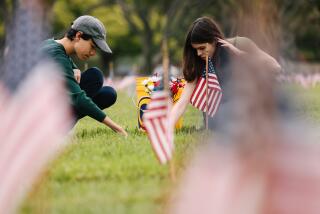L.A. County mass burial honors more than 1,600 unclaimed bodies

In a simple ceremony Wednesday, about two dozen people gathered over a single grave holding the ashes of more than 1,600 people whose bodies were never claimed by loved ones.
With dense fog enveloping the quiet hill above a busy Boyle Heights intersection and the smell of burning sage lingering in the morning air, county officials, soup kitchen volunteers, chaplains and mourners prayed over the ashes of 1,656 people.
Yvette Gonzales, 36, came with three friends to pay final respects to her mother, who was homeless when she died Oct. 2, 2009. She’d heard about the service on the news after waking Wednesday, and ran over hoping her mother had been finally buried.
The mass burial is a custom each December at the Los Angeles County Crematory and Cemetery.
Ashes at the county morgue — including the homeless and those whose families simply could not afford to bury or cremate them — are kept in storage for two to three years before being sent to the common grave, according to the coroner’s office. Most who were buried this week died in 2009.
Gonzales, who was incarcerated when her mother died, learned of the death after she was released.
“Me and my brother, we’re the only ones now,” she said. “We tried to get her ashes, but we never got enough money.” The Rev. Chris Ponnet, the County-USC Medical Center chaplain who has led the service the last five years, said it differs sharply from other burials: There are no personal histories to read, no names. And rarely is there a grieving family.
After a few words, Ponnet stepped aside for burial rites from multiple faiths, including readings from Islamic, Jewish, Hindu and Christian traditions recited in Korean, Spanish and English. In Native American tradition, a barefoot woman chanted and beat a canvas drum, turning in the four directions of the compass, briefly drowning out the hum of the buses and trains on the other side of the cemetery fence.
The service concluded with the 23rd Psalm. Mourners sang a hymn: “Blessed are your poor, for the kingdom shall be theirs.”
Each year, a new mass grave is marked with a roughly 4-by-4-inch plaque inscribed simply with the year. County-USC has conducted the burials since 1896.
There currently are 5,369 people on the coroner’s online unclaimed persons list.
“All of these folks represent the work that we do for the community: identify bodies, trying to reunite families,” said Craig R. Harvey, chief coroner investigator. “It’s sad that a lot of it comes down to the almighty dollar.”
Sometimes, family members discover too late that a loved one was buried in the mass grave. A few small markers with individual names are scattered throughout the cemetery — each a personal memorial, each telling a story.
Near the marker for 1966, a small stone is dedicated to Jeffery, a 5-year-old “beloved brother and son.” A toy pinwheel buried in the dirt near his stone squeaked and turned in the wind.
A man named Thomas, born March 14, 1947, was memorialized a foot away from the stone for the year 2000. A single, fading blue flower rested near the engraving, “Remembered with love.”
As the ceremony came to a close, mourners scattered rose petals over the freshest grave, decorated with flower arrangements from county officials.
A few feet away, a man and woman in dark clothing embraced.
Selene Santiago and Dres Vasquez were attending the service for the first time. Though they knew none of the dead, they wanted to pay their respects. Santiago dapped her face with a tissue during the service.
Santiago, 34, of Alhambra grew up in Boyle Heights. As a teenager, she often walked through the cemetery, reading the gravestones. She never knew about the section dedicated to the county burials.
“I thought about the people and what it means to die alone,” she said. “I wondered what was going through these people’s minds and whether they even knew there would be a formal service.”
Gonzales took another look at the humble grave where her mother was buried. She finally feels closure, she said. It has been more than three years since her mother’s death, but every time Gonzales sees a green traffic light, she’s reminded of her mother.
“They’re green,” she said, “her eyes were green.”
More to Read
Sign up for Essential California
The most important California stories and recommendations in your inbox every morning.
You may occasionally receive promotional content from the Los Angeles Times.












